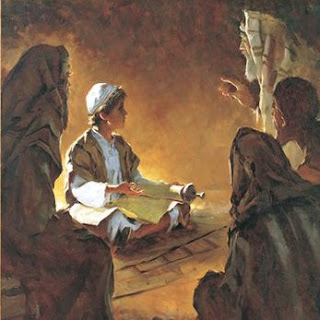For what it's worth, some of my own potted ramblings and ponderings on the gospel passage for tomorrow.
The
lectionary time-warp at this time every year makes me laugh: this
time last week Jesus hadn't actually been born yet; now, suddenly, he's
12 - they grow so fast... :)
The young Jesus, along with his family, are in Jerusalem to celebrate the Passover. The reading implies that this is an annual practice that this family, immediate and extended, appear to keep. Once the Passover has been and gone, all begin the journey home, but Jesus quietly turns back and heads off to the temple.
Cue scene at the temple: here's a kid - well, a young man given he's 12 - sitting there amongst the teachers, all the wise and learned folk.
There he is listening to all that's being discussed. This is important: it makes the point that there's a maturity in the way he is engaging - he listens first, speaks second, he's not just spouting off.
He then asks questions; he is curious about this faith/ religion and wants to know more, wants to see how things are, how they work, what things mean, and why this is so.
All who hear him are amazed: they hear him. Here's a bunch of grown ups who are taking a young person seriously:
1/ by letting him remain in their midst in the first place, not sending him out to do some activity...
2/ by responding to him - they are obviously answering his questions - or at least in conversation
3/ by not shutting him up
4/ by acknowledging that this young'un has something of value to say/ to add to the conversation.
If I were prepping for sermon tomorrow, I think I might be inclined to head along a theme of how we engage with the younger folk in our parish / congregation...
how do we make space for them?
how do we engage with them?
do we listen?
do we acknowledge there's something we can learn
do we allow space for them to listen and speak...?
if we have a conversation, is it one way or two way?...
when we say 'we want more children and young people' - do we really mean that? Or, is it conditional - only when it is on our terms?
In the passage, the boy Jesus is not merely tolerated, but accepted and even celebrated as a valued person in their midst. If we don't value our young people - on various spiritual/ practical/ emotional etc. levels, we should not be surprised if 'numbers' [ugh 'success' measured as statistics, dislike!] are low... and rather, be surprised if we do actually have some at all.
hmmm, accidentally now have half a sermon... ooops.
Saturday, 29 December 2012
Friday, 7 December 2012
meanwhile, 96 000 words into the thesis...

*talking to earlier research Nikki version*
'gosh, I'm actually impressed - you really did do more than just play
computer games when looking at this particular section of the thesis.
Jolly well done self.'
*earlier research Nikki*
'why thank you.
There were indeed occasions when I needed a little distracting from
rescuing naughty sorceresses and such-like. Although, I note with
pleasure the return of that much-loved favourite game at this time of
year 'Hunt the Haggis'. What impact do you think its return will have
on your current thesis section?'
*current research Nikki...furrows brow...looks up from game*
'Hmmmm? Ack, just missed a golden haggis in Loch Ness...'
*earlier research Nikki*
'Ahhhh. Plus ça change'
*cue sound of gurgling haggis in background*
'Ahhhh. Plus ça change'
Subscribe to:
Posts (Atom)
